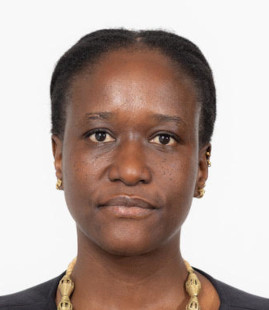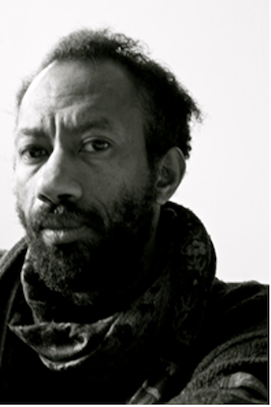|
|
|
Keynotes and writers
 |
Gabeba Baderoon (Photo credit: Victor Dlamini) Gabeba Baderoon is a South African poet and scholar. She is the author of the poetry collections The Dream in the Next Body, A hundred silences and The History of Intimacy as well as the monograph, Regarding Muslims: from slavery to post-apartheid. With Desiree Lewis, Gabeba is co-editor of Surfacing: On Being Black and Feminist in South Africa and she has also edited poetry books by Bandile Gumbi, Epiphanie Mukasano, Phillippa Yaa De Villiers and Natalia Molebatsi. Gabeba is a member of the editorial board of the African Poetry Book Fund, which has published over 100 collections by African poets since 2012, and co-directs the African Feminist Initiative at Penn State University. She is the 2023 Sarah Baartman Senior Fellow in the San and Khoi Centre at the University of Cape Town, where she has been working on a new collection “The Concussion Diaries: Relief Map of a Drifting Mind.”
|
 |
Amanda Boetzkes, The Reorigination of Realism in Contemporary Inuit Art: Founding Environmental Justice with a Teenage Magical Magic Magician In this lecture, I will consider the renewed importance of realism in navigating the confluence of art, decolonial praxis and environmental justice. While the aesthetics of realism have been reinvigorated in the context of the “post-truth” era, a time characterized by the rise of populism and the exhaustion of critique, I suggest that realism’s challenge can best be understood through scenes of its reorigination in Inuit art. I argue that Inuit art reenacts originary experiences in which reality is contested across the parameters of epistemology. Inuit art founds a common origin of art and politics, and unveils their mutual corroboration as a counter-hegemonic force of realism. Through a discussion of the concept of sulijuk and its contemporary iterations in the work of Annie Pootoogook, Shuvinai Ashoona and the film collective Isuma, I consider the terms by which Inuit art delivers an aesthetico-political form of realism that overturns paternalistic approaches to environmental justice. Such a feat could only be achieved with a teenage magical magic magician… Amanda Boetzkes is a theorist of contemporary art and aesthetics. Her research focuses on the relationship between perception and representation, theories of consciousness, and ecology. She has analyzed complex human relationships with the environment through the lens of aesthetics, patterns of human waste, and the global energy economy. She is the author of Plastic Capitalism: Contemporary Art and the Drive to Waste (MIT Press, 2019), The Ethics of Earth Art (University of Minnesota Press, 2010), and a forthcoming book titled Ecologicity: Vision and the Planetarity of Art. Co-edited books include Artworks for Jellyfish and Other Others (Noxious Sector, 2022), Heidegger and the Work of Art History (Routledge, 2014), and a forthcoming volume on Art’s Realism in the Post-Truth Era (Edinburgh University Press, 2024). Her current project, At the Moraine, considers modes of visualizing environments with a special focus on Indigenous territories of the circumpolar North. Amanda Boetzkes is Professor of Contemporary Art History and Theory at the University of Guelph. She lives in T’karonto (Toronto, Canada) which is covered by Treaty 13 with the Mississaugas of the Credit.
|
 |
Elizabeth DeLoughrey, Mining the Seas: Speculative Fictions and Futures This lecture examines the recent oceanic turn in the humanities, particularly what Gaston Bachelard once termed the “depth imagination.” It stages an interdisciplinary conversation between recent scholarship about the speculative practices of Deep Sea Mining and speculative fiction that imagines techno-utopian futures of human life under the sea. In doing so it raises questions about the ways in which particular kinds of literary genres and reading practices produce an extractive imaginary, with a particular concern with the way in which terms like the “blue humanities” might trade in neoliberal discourses. Elizabeth DeLoughrey is a professor in the Department of English and the Institute of the Environment at University of California, Los Angeles on the unceded territories of the Gabrielino Tongva. She has been the recipient of fellowships from organizations such as the Guggenheim, Rockefeller, and the Rachel Carson Centre. She is the author of Routes and Roots: Navigating Caribbean and Pacific Literatures (U of Hawai’i Press, 2007) and Allegories of the Anthropocene(Duke UP, 2019), an open access text that examines climate change and empire in the literary and visual arts. She is co-editor of the volumes Caribbean Literature and the Environment: Between Nature and Culture (Virginia UP, 2005); Postcolonial Ecologies: Literatures of the Environment (Oxford UP, 2011); and Global Ecologies and the Environmental Humanities: Postcolonial Approaches (Routledge, 2015) and of numerous journal issues on critical ocean and island studies.
|
 |
Graham Huggan, Postcolonial blues, blue postcolonialisms Postcolonial studies has been seen as a quintessentially melancholic discipline, prone to theoretical infighting and painfully aware of the limited difference that many, possibly even most, of its intellectual manoeuvres make. Melancholia also afflicts the field’s practitioners in other ways, for example, in their consciousness of their own western biases in spite of their commitment to the dissemination of other, non-western knowledges; and perhaps above all in their realization that, for all the triumphant rhetoric that accompanied their emergence, many postcolonial states have notably failed to bring justice to their own peoples, while new forms of oppression have sprung up that offer reminders of an unfinished colonial past. It is important to recognize, though, that there are different forms of melancholic thought, with different institutional effects and real-world consequences. For Jacques Derrida, for instance, critical melancholia is a precondition for justice, work towards which is never finished – which is not the same thing as to say that there is no justice possible in this world, or that the only justice is the justice to come. In this paper, I want to reflect on the melancholic potential offered by postcolonial studies; on the ways in which melancholia can be used as a revolutionary trigger in which – following the Marxist historian Enzo Traverso – mourning and militancy are productively conjoined. I will draw on two canonical postcolonial literary texts, Arundhati Roy’s The God of Small Things and Amitav Ghosh’s The Hungry Tide, to further my argument. Both texts, and the Subcontinental wetland environments in which they take place, provide almost paradigmatic examples of the bringing together of social and ecological justice, but both are also profoundly melancholic in their awareness that past and present injustices are not easily repaired, or even possible to repair. In this and other ways, the paper will take issue with the increasingly popular view that postcolonial criticism and ecocriticism alike need to move beyond critique and the ‘politics of negativism’ in order to find an appropriate path to ecological sustainability and social justice (Adamson et al.). Instead, it will argue that one of their most important roles is to perform a ‘splenetic melancholy’ (Traverso) that speaks to the vanquished of history without necessarily abandoning hope in a liberation to come. Graham Huggan teaches in the School of English at the University of Leeds. His research straddles three fields: postcolonial studies, environmental humanities, and tourism studies, all of which come together in his latest monograph, Colonialism, Culture, Whales: The Cetacean Quartet (Bloomsbury, 2018). His latest book is the co-authored Modern British Nature Writing, 1789-2020: Land Lines (Cambridge University Press, 2022), and current pursuits include running a doctoral programme in Extinction Studies and co-leading an international research project on European national parks.
|
 |
Alecia McKenzie Alecia McKenzie is a Jamaican author currently based in Paris. Her first collection of short stories, Satellite City, and her novel Sweetheart have both won Commonwealth literary prizes. Sweetheart has been translated into German and French and was awarded the 2017 Prix Carbet des lycéens. Her most recent novel is A Million Aunties (longlisted for the 2022 Dublin Literary Award). (www.aleciamckenzie.com) |
 |
Karthika Nair (Photo credit: Koen Broos) Karthika Naïr is the co-author of A Different Distance (Milkweed Editions, 2021), renga written with poet Marilyn Hacker. Until the Lions: Echoes from the Mahabharata, her reworking of the foundational South Asian epic in multiple voices, won the 2015 Tata Literature Live Award for Book of the Year (India), and was highly commended at the 2016 Forward Prizes (UK). Les Oiseaux électriques de Pothakudi (Éditions Hélium/Actes-Sud, 2022), her latest children’s book illustrated by Joëlle Jolivet, is on the shortlist of the 2023 Prix Félipé and the 2023 Prix Franco-Allemand de la littérature de jeunesse. Naïr’s poetry has been widely published in anthologies and journals like Granta, Los Angeles Review of Books, Poetry Magazine, Poetry International, Indian Literature, The Bloodaxe Book of Contemporary Indian Poets and the Forward Book of Poetry 2017. She is a 2012 Sangam House Fellow, a 2013 Toji Foundation Fellow, and was awarded a Villa Marguerite Yourcenar Fellowship in 2015. Karthika Naïr’s play Beneath the Music, created and directed by Jay Emmanuel for Encounter Theatre, premiered at the Subiaco Arts Centre in Perth in May 2023. The performances she has scripted and co-scripted have been staged at venues across the world. These include Akram Khan’s multiple-award-winning DESH, and Until the Lions (adapted from a chapter of her eponymous book), an opera produced by Opéra national du Rhin (also adapted from the same book), and Carlos Pons Guerra’s Mariposa, a queer reimagining of Puccini’s opera Madame Butterfly. She is the co-founder of Sidi Larbi Cherkaoui’s Antwerp-based dance company, Eastman, and executive producer of several of his and Damien Jalet’s works (Vlaemsch, Shellshock 2018, Les Médusés, Puz/zle, Babel(Words), Three Spells…).
|
 |
Claire Omhovère, The Trouble with Landscape: Reappraisals of the Eyesore in Recent Canadian Writing and Visual Art Canada’s promotion of its image as a natural haven has intensified in recent years, especially in circumstances when the public sphere has grown wary of the environmental impact of extractivism without being ready to renounce its benefits. In this context the preservation of the wild has become a promotional mantra, and greenwashing a widespread strategy to guarantee jobs without alienating communities of voters. Lumber companies operate behind thin curtains of trees that disrobe unsightly clearcuts from the view of motorists in British Columbia. A similar strategy has been adopted with strip mining in the Athabasca region should the site of extraction be close to the highway. Most of the time, however, the exploitation of natural resources occurs in places that are so remote from Canada’s urban centers that the sites of extraction can only be reached by plane, which means that industrial operations can take place on a large scale with few immediate, visible effects, except for the Indigenous populations living in the same area (see Boschman & Trono 2019). This talk aims to query the distrust of landscape that has been asserting itself along with rising concern for the degradation of natural environments, particularly in countries that have historically come to depend on the exploitation of staple resources colonial economies induced (Barney in Wilson et al, 2017: 90). Relying on examples predominantly drawn from the petrofiction, poetry and visual art that came out of the Harper decade, I propose to reflect on the three visual regimes – the unsightly, the unseen and the invisibilized – that trouble the aesthetic appreciation of the natural environment as landsc(r)ape (Boetzkes 2017). The final aim of this talk is to observe how these visual regimes direct the gaze to the mutual dependency between colonial and environmental exploitation, thereby putting a strain on the moralizing discourse of a sentimental ecology cut off from a concrete, material engagement with place, no matter how disquieting its effects. Claire Omhovère teaches English and Postcolonial Literature at University Paul Valéry – Montpellier (France) where she is affiliated to the research group EMMA (Études Montpellieraines du Monde Anglophone). Between 2011 and 2017, she presided the French Association of Postcolonial Studies (SEPC), and was the general editor of the periodical Commonwealth Essays & Studies. Her research is broadly concerned with perceptions and representations of space in postcolonial literatures with a specific interest in the aesthetic and ethical dimensions of landscape writing in settler-invader colonies such as Canada, Australia and New Zealand.
|
 |
Uhuru Phalafala Uhuru Phalafala (PhD) is a senior lecturer in the English department at Stellenbosch University, with teaching interests in critical race studies, material and expressive cultures, black radical traditions, and decoloniality. She is preoccupied with practices and poetics of be-ing together with ancestors, the land, plants and animal, cosmos and waters. This protracted contemplation has thus far produced essays, a sonic documentary, poetry, and a turn to deep listening as bodied method. She is the author of Mine Mine Mine and Keorapetse Kgositsile & the Black Arts Movement, and is currently based in Cairo. |
 |
Denis Pourawa
A Kanak poet and writer, Denis Pourawa has been living for fourteen years in Paris, working on the decolonisation of the imagination. His humanism expresses itself in his poetry and through his involvement in several associations. His collection of poetry, La Tarodière (Vents d’ailleurs, 2010), is critical of the neo-liberal, capitalist model of society. He has many years of experience teaching writing workshops and is the creator of a methodology based on the concept of “Hûmwado Symbiocracy,” a form of education and training that decolonises the imagination and aims at repairing consciousness. |
 |
Sneharika Roy, Biopolitical Allegories of Deforestation: A Buddhist Jataka, Ursula Le Guin’s The Word for World is Forest and Derek Walcott’s Omeros In the “Kusanali Jataka” (c. 300 BCE – 300 CE), the Buddha is reincarnated in one of his previous lives as humble kusa grass, a symbolic nonhuman equivalent of a low caste subject. He saves the fine Mukkhaka tree from being cut down by carpenters acting on the imperial authority of King Brahmadutta. In Derek Walcott’s Omeros (1990), felled trees and ecocide allegorise the genocide of the Caribs and the massacre of the Lakota Sioux warriors. In Ursula Le Guin’s science-fiction novel The Word for World is Forest (1972), the systematic colonial deforestation of planet Athshea by Earth is part of an entangled allegory of the exploitation of arboreal, gendered and racialised bodies within an interstellar capitalist economy. Inflected by Daoist and Buddhist philosophies of non-violence, Le Guin’s novella was also a response to the Vietnam War, the context in which the concept of ecocide emerged to designate the deliberate, targeted destruction of the environment. This transhistorical corpus points to the enduring presence of “biopolitical allegories” in which forms of hegemonic violence (caste-based Brahmanism, European imperialism and American neo-imperialism) are inscribed on the human and nonhuman bodies of their victims in contexts of internal and external colonialism. This lecture therefore proposes an overdue ecocritical update of Fredric Jameson’s “national” allegory, aligning it more explicitly with questions of environmental justice and cultural ecology. Jameson argues that in postcolonial literature, the struggles of the independent nation are embodied allegorically by embattled characters. Alongside such national allegories, however, are “biopolitical allegories” that can be understood using both Buddhist and post-humanist epistemologies that value all forms of sentience. Biopolitical allegories problematize and puncture discourses of biopower, which convert human and nonhuman sentient bodies to fungible units of hierarchical observation, normalisation and state-sponsored corporate management. Walcott’s Omeros, however, includes a productive counterpoint. In the opening and closing of the poem, tree-cutting also allows for the assertion of the dignity of subaltern labour premised on use and need (not exchange value and surplus), albeit positioned precariously within ever-encroaching systems of capitalist exchange and land development. Sneharika Roy is Associate Professor of Comparative and English Literature at the American University of Paris. Her teaching and research eclectically bridge classical and contemporary traditions. Her book The Postcolonial Epic: From Melville to Walcott and Ghosh (Routledge, 2018) traces the emergence of a postcolonial form of classical epic, prefigured by Moby Dick. Her focus on epic is reflected in her contributions to MLA Approaches to Amitav Ghosh (2019) and The Epic World: Comparative Approaches (upcoming, Routledge). A shift from epic to other genres and critical theory is visible in her subsequent interventions. These deal with the Black radicalism of Cedric Robinson and Paul Gilroy, the science-fiction of Ursula Le Guin and the early poems in prose of Édouard Glissant. Recently, she has turned to ecocritical investigations of ancient and contemporary literatures, evidenced in papers on Buddhist jatakas, ecosocialism in science-fiction, and Glissant’s conception of the ecological Relation.
|
 |
Imre Szeman, The Future of the Sun 2025 is when global fossil fuel use will finally begin to decrease, ending a period of energy history initiated in the eighteenth century which has traumatized the earth and its inhabitants. What happens next? “The Future of the Sun” assesses claims being made about the best approach to energy transition and the shape of the renewable world that lies just over the horizon. Nation-states and entrepreneurs are offering publics competing visions of energy and environmental futures, even as right-wing ideologues fight to ensure the future looks much like the past. Who should we believe can and will undertake climate action in the interest of all the planet’s inhabitants? Are each of these actors only in it for themselves? What do the gaps, limits, and problems in the plans of the powerful tell us about how to best approach energy transition, so that we get the environmentally just futures we want? And what specific insights do contemporary literature and culture give us into the discursive struggles now being fought to establish (in the words of Bill Gates) “the dull, factually correct middle” in which green futures are supposed to be lived out? Imre Szeman is inaugural Director of the Institute for Environment, Conservation, and Sustainability and Professor of Human Geography at the University of Toronto. From 2021-2022, he was the Climate Critic for the Green Party of Canada. He is co-founder of the Petrocultures Research Group, which explores the socio-cultural dimensions of energy use and its implications for energy transition and climate change, and the leader of the After Oil Collective. Szeman is author (most recently) of On Petrocultures: Globalization, Culture, and Energy (2019) and co-editor of the Energized: Keywords for a New Politics of Energy (forthcoming 2023). He is at work on a book examining discursive and political struggles over the transition to a post-fossil fuel world. He is a Fellow of the Royal Society of Canada. (www.imreszeman.ca)
|
 |
Tara June Winch
Tara June Winch (b. December 2, 1983) is an Australian (Wiradjuri) writer based in France. She was mentored by Nobel Prize winner Wole Soyinka as part of the Rolex Mentor and Protégé Arts Initiative. She is the author of Swallow the Air and After the Carnage. Her current novel The Yield (Hamish Hamilton, Penguin) won the 2020 Miles Franklin Literary Award. Editions were published in the US/CA/UK (HarperVia, HarperCollins, 4th Estate) and translated into French(Actes Sud), Dutch (Mozaïek), German (Haymon Verlag), Polish (Czarne) and forthcoming in Mandarin and Arabic. She is currently working in film writing and on her fourth book, In the Event of my Death. Her writing explores Indigenous issues, language and belonging. |
 |
Briar Wood Poet, fiction writer and essayist Briar Wood (Ngāpuhi Nui Tonu) grew up in South Auckland, Aotearoa. She worked extensively as a lecturer in Britain, where she won the HolyerAnGof prize for poetry in Cornwall for her first full-length poetry collection Welcome Beltane (2012). Her second collection, Rāwāhi (Anahera Press, 2017), was shortlisted in the Ockham NZ Book Awards 2018. The third collection A Book of Rongo and TeRangahau was published by Anahera Press in 2022. Her poetry has been extensively published and anthologised. |


